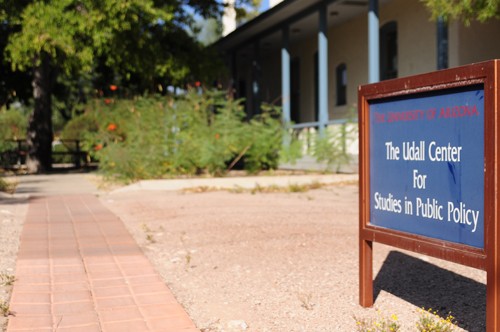Undergraduate student leaders will soon break ground on a demonstration garden intended as a guide to eco-friendly gardening for UA students and the greater Tucson community.
The Udall Center for Studies in Public Policy, located at 803 E. First St., has been selected to house two four-feet-by-20-feet plots that the Desert in the Garden Committee — a subcommittee of the Associated Students of the University of Arizona Sustainability Committee — will use to grow native plants and crops. The garden’s purpose is education rather than crop production, organizers said.
“”We want to give ideas to students and the Tucson community on how to grow a garden,”” said Caleb Weaver, project manager of the Desert in the Garden Committee.
The two plots will be used to grow plants that are suited to Tucson’s climate and temperature, meaning that the plants are able to use less water and tolerate the sun. The garden will also incorporate water harvesting into its irrigation system, he said.
The committee will give educational tours of the garden to university students as well as students from elementary and secondary schools in Tucson in order to teach them how to start gardens in their own communities, he said.
“”Students need to find out where their food comes from,”” said Weaver. “”There is a culture in America where food comes in a box, but food comes from the fields and hard labor, and it is important to know where your food comes from, and what you’re eating.””
Funding for the garden will come from a combination of grants and student fees, he said.
“”In the spring, ASUA Sustainability Committee polled students about their student fees, and students overwhelmingly decided to make sustainability a priority. $50,000 was set aside for ASUA Sustainability projects,”” Weaver said.
Professor James J. Riley, who teaches the water harvesting course, said there was a need for faculty involvement in student-led projects.
“”I think the students have a strong interest in making the campus more sustainable. Therefore, I think they should have a major role. However, our experience has been that it takes students, facilities management staff and faculty working together to make a successful project,”” he said.
Though the Garden in the Desert Committee has received assistance from faculty members, the project has been almost completely student-led, committee member Sophia Montes said.
The Udall Center gives students the resources necessary to carry out such projects on their own, said Stephanie Rainie, operations manager for the Udall Center.
“”We do have faculty, but we always seek ways to integrate students into the activities we support. It allows students to demonstrate their ingenuity,”” she said.
Students can become involved in the Desert in the Garden Committee and the greater ASUA Sustainability Committee through an application process on ASUA’s Web site. Students involved can receive independent study or educational leadership credit for a four hour per week work commitment.
The Garden in the Desert Committee is waiting for the garden’s final approval from the Marshall Foundation, which owns the plots used by the Udall Center. The students hope to break ground within the next month or two.
Weaver said he hopes the garden will not only create a more sustainable campus, but also a greater awareness on an individual level.
“”I hope people will start eating healthier, that people will start a garden of their own,”” he said. “”It’s pretty easy to put seeds in a pot and water them everyday while learning about where your food comes from.””









